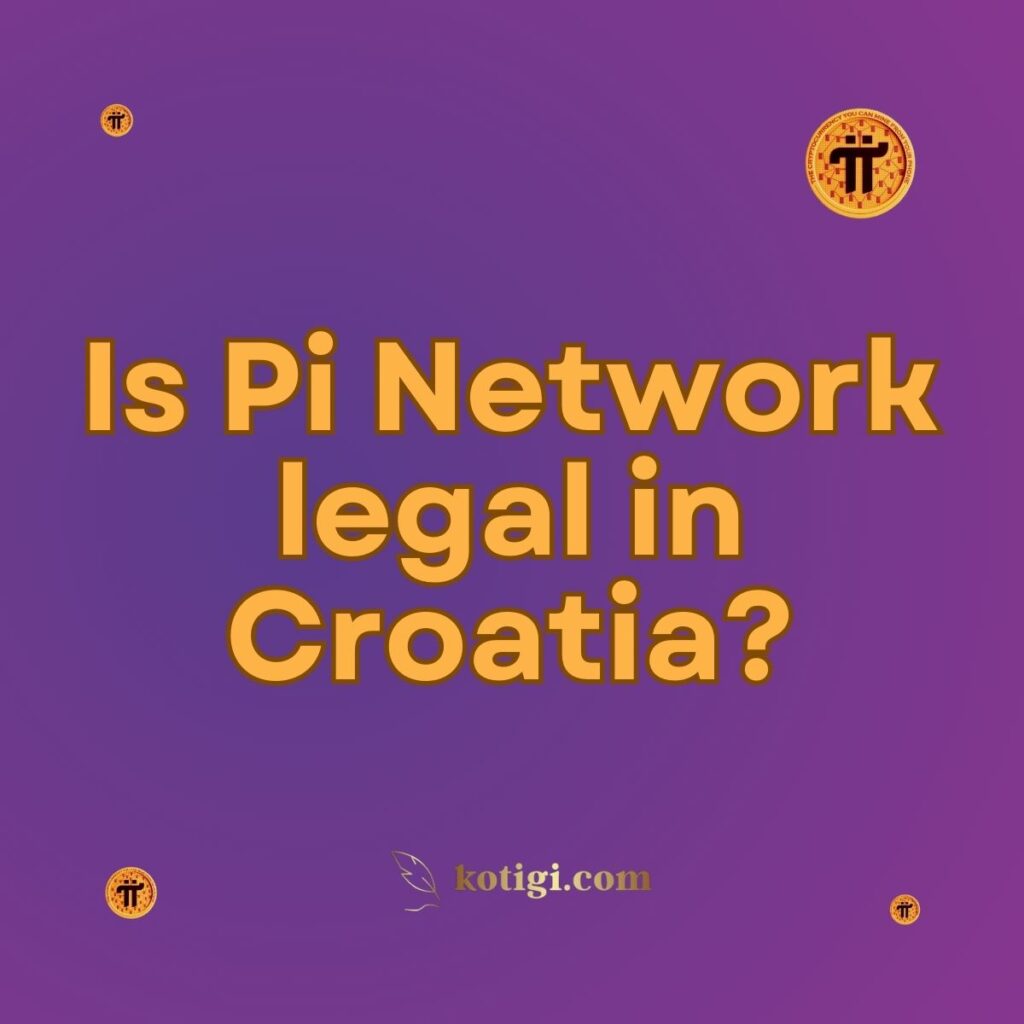
Is Pi Network legal in Croatia?
Pi Network operates within a neutral regulatory framework in Croatia. While Croatia does not have specific laws governing Pi Network or other cryptocurrencies, it allows their use and trading, as long as individuals adhere to the country’s financial and anti-money laundering regulations. Pi Network users can mine and use Pi coins without significant legal risks, but should remain cautious about the evolving regulatory environment.
Introduction
With the increasing global adoption of cryptocurrencies, countries are developing diverse regulatory frameworks to manage their use. Croatia, like many European nations, does not have a specific legal framework for cryptocurrencies like Pi Network. While the Croatian government does not officially recognize cryptocurrencies as legal tender, they are not banned either. This creates a legal gray area where platforms like Pi Network can operate, allowing Croatian users to mine and transact with Pi, provided they comply with general financial regulations, particularly those concerning money laundering and tax reporting.
1. Legal Status of Cryptocurrencies in Croatia
Croatia has taken a neutral stance on cryptocurrencies, allowing their use but without officially recognizing them as a form of currency. This provides a level of freedom for users to participate in Pi Network, but also means they must navigate the risks associated with unregulated markets.
1.1 Croatia’s Approach to Cryptocurrencies
While the Croatian government has yet to pass specific legislation governing the use of cryptocurrencies, it has allowed their use under the existing financial framework. This means that Pi Network users can mine and exchange Pi coins freely, but the lack of clear regulations also places more responsibility on users to ensure compliance with applicable laws.
1.2 European Union Influence
As a member of the European Union, Croatia follows broader EU guidelines on cryptocurrency regulation. The EU has been moving toward stricter regulatory frameworks, particularly with regard to anti-money laundering (AML) and counter-terrorism financing (CTF). Croatian users of Pi Network must ensure that they follow these regulations when converting Pi coins into fiat currency or engaging in other financial transactions.
1.3 Financial Institutions and Cryptocurrencies
Croatia’s financial institutions, including banks and the Croatian National Bank (HNB), have issued warnings about the risks of using cryptocurrencies, including their volatility and lack of regulation. However, they have not imposed any significant restrictions on their use, meaning that Pi Network users can engage with the platform without fear of legal consequences, provided they act within the bounds of the country’s financial regulations.
2. Pi Network and Croatian Financial Laws
While Pi Network itself does not fall under specific Croatian cryptocurrency regulations, users must comply with the country’s broader financial laws. This includes adhering to anti-money laundering protocols, taxation, and other financial reporting requirements.
2.1 Anti-Money Laundering Compliance
One of the key legal concerns in Croatia, as in many countries, is ensuring that cryptocurrency transactions are not used for money laundering or other illicit activities. Pi Network users in Croatia must ensure that any transactions they make—especially those involving the conversion of Pi coins into fiat currency—comply with the country’s anti-money laundering (AML) regulations. Failure to do so can result in significant legal consequences.
2.2 Tax Obligations for Cryptocurrency Users
Croatian tax authorities consider cryptocurrency gains as taxable income. Therefore, Pi Network users who earn or trade Pi coins are required to report their earnings and pay taxes accordingly. The lack of specific regulations around Pi Network does not exempt users from their tax obligations, and failure to declare earnings from cryptocurrency activities could lead to fines or other penalties.
2.3 Financial Transparency
While Pi Network operates outside traditional financial institutions, Croatian users are still required to ensure transparency in their transactions. This is especially important for large transactions or when converting Pi coins to Croatian kuna (HRK), as these could trigger scrutiny from financial authorities. It is advisable for Pi Network users in Croatia to maintain clear records of their transactions to avoid any potential legal issues.
3. Potential Risks and Challenges for Pi Network Users
The legal landscape for Pi Network and other cryptocurrencies in Croatia remains somewhat unclear, leading to both opportunities and challenges for users. While the lack of regulation allows for greater freedom, it also exposes users to certain risks.
3.1 Lack of Consumer Protection
One of the primary risks for Pi Network users in Croatia is the lack of consumer protection. Since Pi Network and other cryptocurrencies are not regulated by the Croatian government, users have limited recourse if they fall victim to fraud, theft, or other losses. This makes it essential for users to exercise caution when trading or mining Pi coins.
3.2 Potential for Future Regulations
Although Croatia currently has a hands-off approach to cryptocurrency regulation, this could change in the future. As more people in Croatia and across Europe adopt cryptocurrencies, governments may introduce stricter regulations to protect consumers and ensure financial stability. Pi Network users should be aware of the potential for regulatory changes and be prepared to adapt to new legal requirements.
3.3 International Scrutiny
Since Pi Network operates internationally, Croatian users may also be affected by legal developments in other countries. For example, if the EU adopts stricter cryptocurrency regulations, Croatia may follow suit. This could lead to additional compliance requirements for Pi Network users in Croatia, particularly in areas like identity verification and financial reporting.
4. Future of Cryptocurrency Regulations in Croatia
As the use of cryptocurrencies continues to grow, it is likely that Croatia will introduce more comprehensive regulations to govern the sector. This could have a significant impact on Pi Network users, particularly in areas like taxation, transparency, and consumer protection.
4.1 Potential for Cryptocurrency-Specific Laws
While Croatia currently lacks cryptocurrency-specific regulations, the government may introduce laws in the future as digital assets become more mainstream. These regulations could include provisions for the registration of cryptocurrency exchanges, requirements for identity verification, and protections for consumers in case of fraud or theft. Pi Network users should monitor these developments closely to ensure compliance with any new legal requirements.
4.2 EU-Wide Cryptocurrency Regulations
As a member of the European Union, Croatia may also adopt EU-wide cryptocurrency regulations in the future. The European Union is currently exploring several regulatory frameworks for digital assets, including the Markets in Crypto-Assets (MiCA) regulation, which could introduce stricter rules for the use and trading of cryptocurrencies. If adopted, these regulations could affect Pi Network users in Croatia, particularly in areas like anti-money laundering and consumer protection.
4.3 Impact on Pi Network’s Growth
While new regulations could introduce more challenges for Pi Network users, they could also provide benefits by increasing trust in the platform. For example, stricter regulations could reduce the risk of fraud and encourage more people to participate in the Pi Network ecosystem. This could ultimately lead to greater adoption of Pi Network in Croatia and across Europe.
5. Opportunities for Pi Network in Croatia
Despite the legal uncertainties, Pi Network has the potential to thrive in Croatia, particularly as more people become interested in alternative cryptocurrencies. The platform’s unique approach to mobile mining and its focus on creating a decentralized, user-driven network align with the growing demand for accessible digital assets.
5.1 Mobile-First Cryptocurrency Adoption
One of Pi Network’s main advantages in Croatia is its mobile-first approach to cryptocurrency mining. Unlike traditional cryptocurrencies that require expensive hardware and significant energy consumption, Pi Network allows users to mine Pi coins on their smartphones with minimal energy use. This makes the platform more accessible to a wider range of users, particularly those who are new to cryptocurrencies.
5.2 Growing Interest in Digital Assets
Croatia’s interest in cryptocurrencies is steadily growing, with more people exploring the benefits of digital assets for payments, investments, and financial inclusion. Pi Network’s focus on creating a decentralized economy could resonate with users who are looking for alternatives to traditional financial systems. This growing interest presents an opportunity for Pi Network to expand its user base in Croatia.
5.3 Potential Partnerships and Collaborations
As Pi Network continues to grow, there may be opportunities for the platform to partner with local businesses or institutions in Croatia. These partnerships could help increase awareness of Pi Network and encourage more people to participate in the ecosystem. Additionally, Pi Network could explore collaborations with Croatian universities or tech companies to further develop its blockchain technology and expand its presence in the country.
6. Recommendations for Pi Network Users in Croatia
Given the current legal landscape, Pi Network users in Croatia should take certain precautions to ensure they remain compliant with local laws and minimize potential risks.
6.1 Stay Informed About Legal Developments
As the legal framework for cryptocurrencies in Croatia continues to evolve, Pi Network users should stay informed about any changes that could affect their participation in the platform. Keeping up to date with local news and government statements can help users navigate the regulatory environment and avoid potential legal issues.
6.2 Report Cryptocurrency Earnings
Pi Network users in Croatia should be aware of their tax obligations and report any income earned from Pi coins. This includes profits from trading or selling Pi, which may be subject to income tax. Consulting with a tax professional can help ensure compliance with local tax regulations and avoid potential penalties.
6.3 Use Reputable Exchanges and Wallets
To reduce the risk of fraud or loss, Pi Network users should use reputable exchanges and wallets for storing and trading Pi coins once they become tradable. This will help protect users from scams and ensure they are engaging with legitimate platforms.
Conclusion
Pi Network operates in a relatively neutral legal environment in Croatia, where cryptocurrencies are allowed but not officially regulated. While Pi Network users can mine and use Pi coins without significant legal risks, they must comply with existing financial regulations, including anti-money laundering and tax reporting requirements. As the cryptocurrency landscape in Croatia and the broader European Union continues to evolve, Pi Network users should remain informed about potential regulatory changes and take steps to protect themselves from legal and financial risks.
Key Takeaways
- Pi Network is not specifically regulated in Croatia, but users can mine and use Pi coins under the country’s general financial laws.
- Croatian Pi Network users must comply with anti-money laundering regulations and report cryptocurrency earnings to tax authorities.
- The lack of specific cryptocurrency regulations in Croatia presents both opportunities and risks for Pi Network users.
- Future regulations from Croatia or the European Union could introduce stricter compliance requirements for Pi Network users.
- Pi Network’s mobile-first approach and focus on decentralization make it well-positioned to grow in Croatia’s evolving cryptocurrency landscape.




